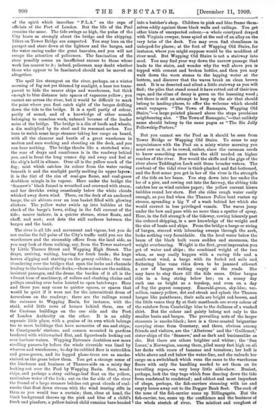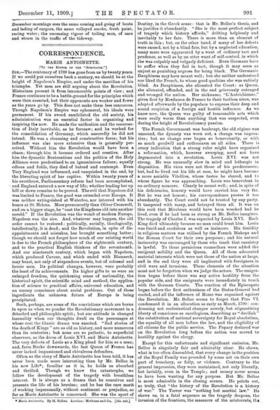THE POOL IN DECEMBER.
THE Tower Bridge has set a difference on the river that Dickens knew; the tide on which Quilp rowed to his counting-house, and Gaffer Hexam earned his grisly living. The difference is of a changing city, of new buildings for old,
of the spirit which inscribes " P.L.A." on the caps of officials of the Port of London. But the life of the Pool remains the same. The tide swings as high, the pulse of the City beats as strongly about the bridge and the shipping: Idlers on Tower Bridge are suspected. You may lean on the parapet and stare down at the lightere and the barges, and the water racing under the great bascules, and you will not escape the attention of policemen. The fascination of the river possibly seems an insufficient excuse to those whose work lies nearest to it; indeed, policemen may doubt whether those who appear to be fascinated should not be moved on altogether.
The spell lies strongest on the river, perhaps, on a winter morning of fog not yet thinned by sunlight, a haze too trans- parent to hide the nearer ships and warehouses, but thick enough to blur distance into spaces of vaporous yellow ; you cannot see across the river, but it would be difficult to mark the point where you first catch sight of the barges drifting down the tide to the bridge. It is a spell partly of colour, partly of sound, and of a knowledge of other sounds belonging to ceaseless work, unheard because of the loader noise of the bridge. The bridge is a din of hoofs and wheels, a din multiplied by its steel and its resonant arches. You turn to watch some large steamer taking her cargo on board, with all the clamour and bustle of a great warehouse in motion and men working and shouting on the deck, and you can hear nothing. The bridge throbs like a stretched wire ; the roar of drays and omnibuses is in the roadway behind you, and in front the long cranes dip and sway and feel at the ship's hold in silence. Over all is the yellow murk of the fog; mist which catches its colour from the water racing beneath it and the sunlight partly melting its upper layers ; it is the tint of the rim of coal-gas flame, and coal-gases doubtless mingle in its vapour. Here under the bridge the ' Seamew's' black funnel is wreathed and crowned with steam, and her derricks swing ceaselessly below the white clouds whisked away down wind. There, on the deck of an anchored barge, the air shivers over an iron basket filled with glowing clinkers. The yellow water swirls up into bubbles at the check of the barge's bows, riding in the fall current of the tide; nearer inshore, in a quieter stream, straw floats, and chaff, and soot ; soot dots the still surfaces between the barges and the bank.
The river is all life and movement and vigour, but you do not realise the full pulse of the City's traffic until you see the warehouses and the steamship offices from the land side, as you may look at them walking, say, from the Tower eastward by Little Thames Street and Wapping High Street. The drays, arriving, waiting, leaving for fresh loads ; the huge horses slipping and starting on the greasy cobbles; the vans thundering over the bridges that span the locks and channels leading to the basins of the docks,—those noises are the sudden, insistent passages, and the drone, the burden of it all is the vibrant hum of machinery, of rollers and clanking chains and pulleys creaking over bales hoisted to open hatchways. Here and there you may come to quieter spaces, or spaces that would be quiet if it were not for the intermittent drum of horseshoes on the roadway; there are the railings round the entrance to Wapping Basin, for instance, with the staid, solid little rows of houses behind them, one of the Customs buildings on the one side and the Port of London Authority on the other. It is an oddly separate little place, with a genius of its own which belongs too to most buildings that have memories of sea and ships; to Coastguards' stations, and cannon mounted in gardens bordered with whitewashed flint, and figureheads looking out over harbour waters. Wapping Entrance doubtless saw more strolling passers-by before the whole riverside was lined by wharves and warehouses; to-day its cobbled floor is untrodden and grass-grown, and its lopped plane-trees are as smoke- stained as the grass below them. You get a strange sense of the blackness and business of Thames-side on a misty day looking out over the Pool by Wapping Basin. Soot, wood- chips, and perhaps a stray cabbage-leaf float on the yellow, motionless water of the lock; out on the far side of the river the funnel of a large steamer belches out great clouds of coal- smoke that float down stream with the wind tearing rifts in them as you would tear a curtain; then, close at hand, the black background throws up the pink and blue of a child's frock and pinafore, a yellow-haired claild4unning bare-headed into a butcher's shop. Children in pink and blue frame them- selves oddly against those black walls and railings. You get other hints of unexpected colour,—a- whole courtyard draped with Virginia creeper, trees spied at the end of an alley on the very brim of the dock. You may even find cleanliness in unhoped-for places ; at the foot of Wapping Old Stairs, for instance, where you might suppose would be the muddiest of river mud. But Wapping Old Stairs is not a stairway into mud. You may find your way down the narrow passage that leads to the stairs, and wonder why the wall above you is topped with cement and broken bottles, and then you may walk down the worn stones to the lapping water at the bottom, and discover that the waves break on clean brown sand. It is as deserted and silent a little stairway as you will find; the piles that stand round it have rotted out of their iron caps, and the slime of decay is green on the lessening wood ; but there is still an attempt to keep up the air that should belong to landing-places, to offer the welcome which should await voyagers. "The Town of Ramsgate, Wapping Old Stairs,"—a large painted placard above the steps proclaims neighbouring ales. "The Town of Ramsgate,"—that unlikely name should belong to the same pages as "The Six Jolly Fellowship-Porters."
But you cannot see the Pool as it should be seen from Tower Bridge or Wapping Old Stairs. To come to any acquaintance with the Pool on a misty winter morning you must row on it, or be rowed, rather, since the oarsman needs to know something more than the skill needed on higher" reaches of the river. Nor would the skiffs and the gigs of the river above Teddington Lock unit these broader waters. The rowboat of the tidal river is thick-planked and flat-bottomed, and the first sense you get in her of the river is the strength of the tide on her beam. You step down into her under the lee of a pier, and rowing out into the fairway, the ebbing tide catches her as wind catches paper; the yellow current hisses bubbles round her stern. But she rides rough water easily enough, as you find when the Thames Police boat rushes up- stream, spreading a big V of a wash behind her which she would correct in less privileged vessels. The waves jump under the bow and pass with no more than a spatter of spray. Here, in the full strength of the tideway, rowing leisurely past the ordered shipping, is a new knowledge of the weight and the size of boats and ships. From the bridge a barge or string, of barges, steered with labouring sweeps through the arch, looks nothing very formidable. On the level water below the beam of the black hulk veers sudden and enormous, the weight overbearing. Weight is the first, great impression you get of water and ships ; the combined weight of the two when, as may easily happen with a racing tide and a south-west wind, a barge with its furled red sails and flattering blue vane rides down to be jammed athwart' a row of barges waiting empty at the roads. She may have to stay there till the tide eases. Other barges ride in a long string below her; on a sunny day each one as bright as a toyshop, and even on a day of fog the gayest company. Emerald-green, sky-blue, ver- milion, canary-yellow, dot and streak and splash the Thames barges like paintboxes; their sails are bright red-brown, and the little vanes they fly at their mastheads are every colour a the rainbow from Cambridge blue to the dullness of a washed shirt. But the colour and gaiety belong not only to the smaller boats and barges. The prevailing note of the larger steamers is smoke-black; here is a three-masted brigantine carrying stone from Guernsey, and there, obvious among friends and visitors, are the 'Albatross' and the Guillemot,' sister-ships of the Seamew,' and as dark and businesslike as she. But there are others brighter and whiter; the San Lucar,' a Norwegian, among them, piled many feet high on all her decks with cases of bananas and tomatoes; her hull is white above and red below the water-line, and she unloads her cargo on a switchback which runs the cases to the warehouse floors with only the handling needed to set them on its travelling ropes,—a very busy little side-show. Busiest, perhaps, look the tiny tugs which fuss dancing down the tide from roadstead to roadstead ; and oddest and most impudent of shape, perhaps, the fish-carriers steaming with ice and empty boxes away out to the Dogger Bank fleet. The cock of the nose of the fish-carrier sums up Billingsgate. But the fish-carrier, too, sums up the. confidence and the business of the whole stretch of river. The mistiest and roughest of
December mornings sees the same coming and going of boats and lading of cargoes, the same volleyed smoke, fresh paint, racing water; the unceasing vigour of toiling men, of oars and steam in the traffic of the tideway.


























































 Previous page
Previous page